Discover how SSO (Single Sign On) can boost enterprise sales for SaaS companies
by Daniel Jesusegun,
In today's ever-changing business world, there is a new avenue for growth: selling to large companies. It's a target often seen as the Holy Grail and a real achievement in terms of maturity for a start-up.
Capturing the attention of large organizations can propel your business to unimaginable heights. The level of sales generated is much higher, and helps to boost the average basket.
In reality, the road to winning these corporate contracts is often full of challenges and requires much patience. Sales cycles with large companies are often long and complex. They require numerous criteria for data management, security and certification. SSO (Single Sign On) connection is one of these criteria; today, more and more large companies require SaaS to connect to their identity management system to enable their employees to connect to SaaS using SSO for security and user experience.
The aim is to put a lot of assets on your side, especially when you're still a small team. In our recently published blog post "Are you ready to start enterprise sales?" we dive into the exciting world of enterprise sales, exploring its vast potential and the hurdles that SaaS companies face. In this article, we'll uncover the secrets of success and look together at some of the features required by large enterprises. One of these essential features is SSO (Single Sign On) authentication. It's like a key to gaining the trust of the business and paves the way for seamless user experiences, and can shorten sales cycles.
Understanding the Enterprise Sales Landscape
Enterprise sales is a fascinating world that sets itself apart from other sales processes. It involves selling high-value products or services specifically designed to meet the needs of entire organizations. One of the key aspects of enterprise sales is its complexity. Unlike selling to small businesses or individual consumers, enterprise sales require a more intricate approach. The sale process can be lengthy, often spanning months or even years. This is because multiple decision-makers within the organization need to be involved before a purchase is made. Navigating through this network of stakeholders requires a strategic and tailored approach to ensure success. It needs specific sales profiles called business engineers.
A business engineer will specialize in managing the technical and commercial aspects of a sales project for a large company. Their primary role is creating and developing customer relationships to understand their needs, propose appropriate technical solutions and conclude commercial contracts. They coordinate between the technical teams, customers and the company's internal departments. They have a solid ability to manage complex sales cycles with many contacts. They can be seen as the person who bridges the gap between technical and commercial aspects, ensuring that the technical solutions that are proposed meet customers' needs while generating profits for the company.
Another thing to consider is the risk involved in enterprise sales. Sales representatives invest a significant amount of time, effort, and resources into nurturing and closing deals. While the rewards can be substantial, there's also the possibility that all the hard work could go unrewarded if the deal falls through. It's essential to understand the intricacies of enterprise sales to minimize risks and maximize the potential for success.
A defining factor in enterprise sales is the complexity of the products or services being offered. For example, enterprise software often requires customization and tailored onboarding to fit the unique needs of each organization. This complexity can result in longer sales cycles, as prospects need extra support and persuasion to fully grasp the value of the solution. That's why enterprise sales teams typically consist of knowledgeable sales executives who have a deep understanding of the product and technical expertise.
By exploring these unique characteristics and complexities, SaaS companies can gain valuable insights into the world of enterprise sales. This understanding helps them navigate complex organizational structures, engage multiple stakeholders, and deliver customized solutions that resonate with enterprise customers. With the right approach, SaaS companies can tap into the immense growth potential of enterprise sales and become trusted partners in driving organizational success.
Building Enterprise-Ready Functionalities to Upsell
When it comes to capturing the attention and trust of enterprise customers, having enterprise-ready features is essential. These features go beyond the core features of a SaaS product and encompass a range of capabilities that meet the specific requirements and expectations of large organizations. By investing in building and enhancing these enterprise-ready functionalities, SaaS companies can position themselves for successful upselling and expansion within the enterprise market.
One crucial aspect of building enterprise-ready functionalities is authentication. Implementing robust authentication protocols like SAML (Security Assertion Markup Language) and SSO (Single Sign-On) enables seamless and secure user access across multiple systems and applications. This eliminates the need for users to remember multiple credentials and simplifies the onboarding process, enhancing user experience and productivity.
Let’s take a look at some of the top SaaS companies’ pricing model:
Successful SaaS companies have clearly understood the specific needs of key accounts.
As we shall see, most of them have developed a dedicated pricing package, often called an "Enterprise" package.
Usually, these dedicated packages for large accounts include SSO authentication and SCIM protocol provisioning functionalities.
Examples of SaaS pricing models
Notion pricing Model :
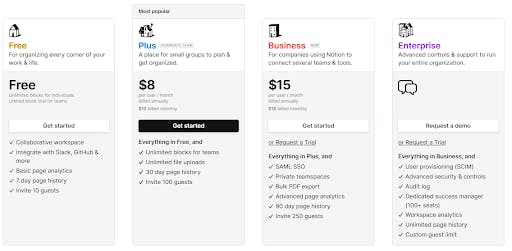
**Slack pricing model: **
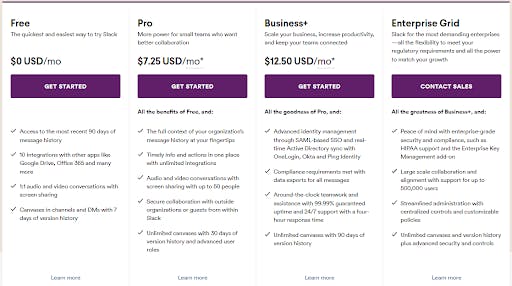
Trello pricing model:
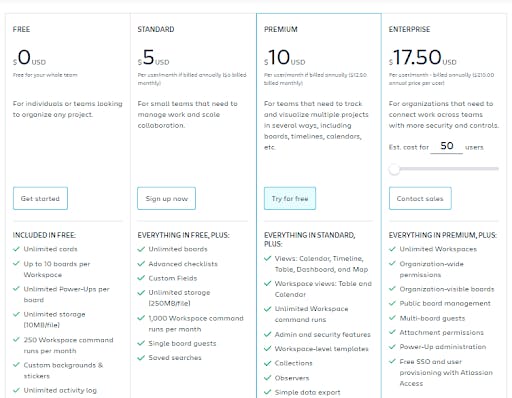
CLICKUP pricing model:
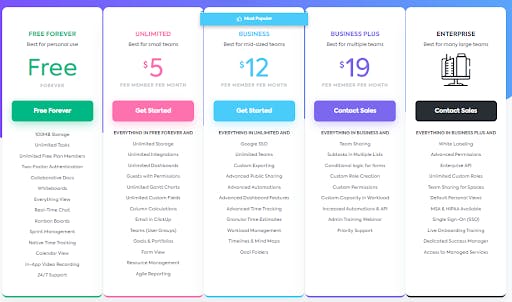
From the pictures above, top SaaS companies like Notion, Slack, Trello, and ClickUp have successfully implemented enterprise-ready functionalities. They offer flexible pricing models and features tailored to enterprise customers' needs. For example, Notion provides different pricing tiers based on team size and offers enterprise features like advanced permissions and collaboration tools. Slack offers enterprise-grade security features, compliance certifications, and integration capabilities with various systems. Trello offers enterprise-level security controls, customizable workflows, and team visibility features. ClickUp offers enterprise plans with enhanced security, customization options, and dedicated customer support.
These SaaS companies are able to provide enterprise-ready functionalities and effectively upsell their products by recognizing the importance of meeting the unique needs of large organizations. Looking at the various pricing models listed above, a common thread is the presence of a Single Sign-On (SSO) as a crucial functionality for enterprise sales.
Let’s take a more in-depth look into that:
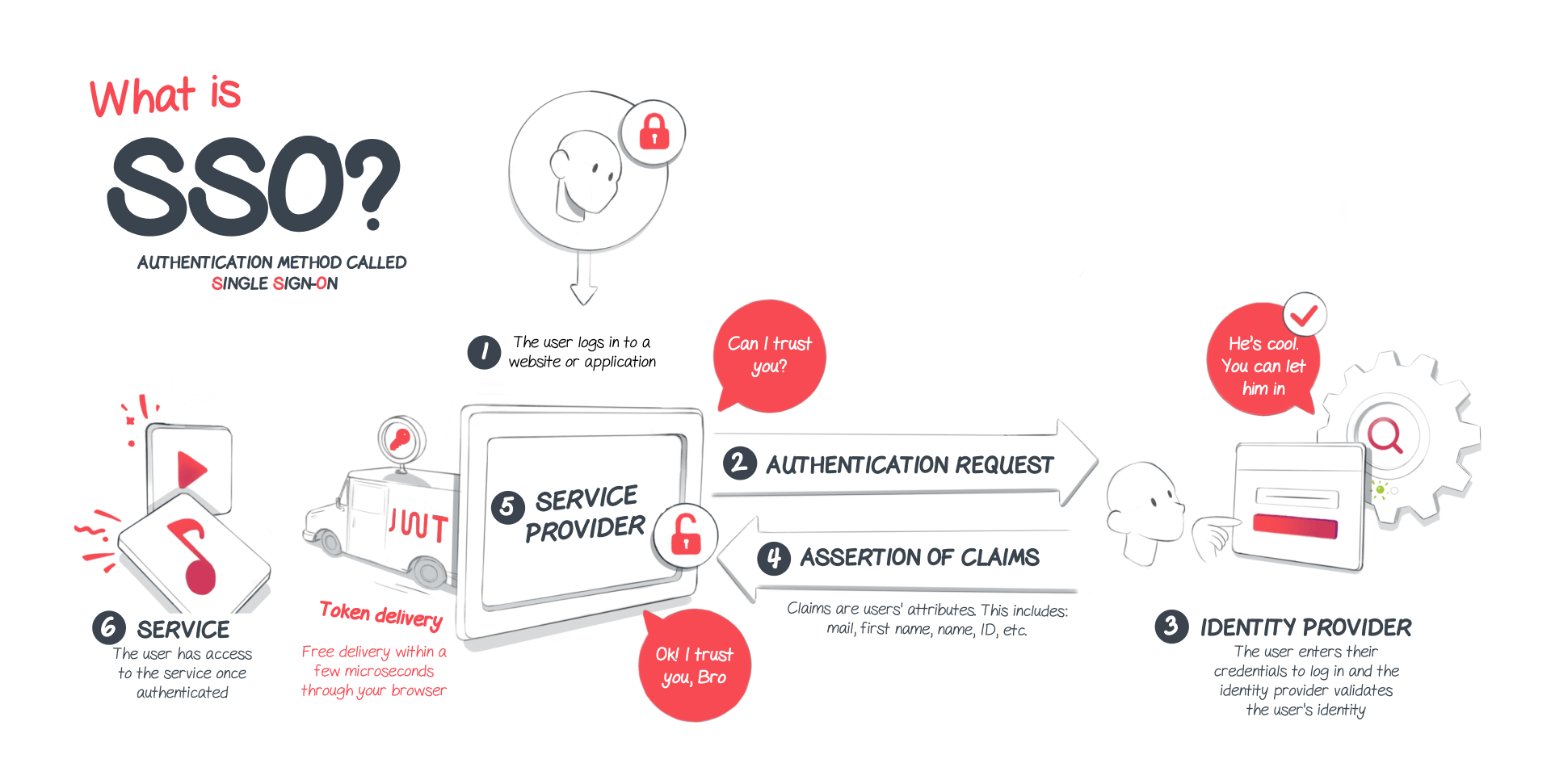
Unleashing the Power of Single Sign-On (SSO)
SSO plays a pivotal role in streamlining authentication processes for enterprise users. It eliminates the need for repetitive login credentials, providing a seamless and convenient login experience. With SSO, users can log in once and gain access to multiple applications and services without the hassle of multiple login prompts.
By incorporating SSO into their enterprise solutions, SaaS companies unlock a host of benefits that directly contribute to their success. Let's delve deeper into the significance of SSO:
Simplified User Experience: SSO simplifies the authentication journey for enterprise users, eliminating the need to remember and enter different sets of credentials for various applications. This streamlined user experience enhances productivity, reduces friction, and fosters a positive perception of the SaaS company's offerings.
**Enhanced Security: **SSO solutions often include robust security measures such as multi-factor authentication and centralized access controls. By implementing SSO, SaaS companies can fortify the security of their enterprise sales solutions, addressing the concerns of enterprise customers regarding data breaches and unauthorized access.
Seamless Application Integration: Enterprises often have diverse software systems and applications in their IT environments. SSO facilitates seamless integration by providing a standardized authentication framework. This simplifies the onboarding process and enables the SaaS company to seamlessly integrate their solution with existing enterprise systems, reducing implementation time and effort.
Compliance and governance: Many industries, such as healthcare and finance, have stringent regulatory requirements concerning data privacy and access control. SSO solutions help SaaS companies meet these compliance obligations by enforcing strong authentication protocols and centralizing user access management. By incorporating SSO as part of their enterprise-ready offerings, SaaS companies can attract customers in highly regulated sectors and drive sales growth.
Build Vs. Buy: Key Considerations and Best Practices for SSO Implementation
The common question SaaS companies ask is whether to build their authentication process or outsource it. That's a valid question, and we touched it in our previous article here but let me break it down for you.
Direct integration essentially means building your own authentication system from scratch. However, this approach can be stressful and costly. Developing a robust and secure authentication system requires significant time, effort, and expertise. You need to design, build, test, and maintain the infrastructure, handle user management, password resets, and security measures like two-factor authentication. It's a complex undertaking that can distract your team from focusing on your core product or service.
Direct integration involves taking full ownership and control over every aspect of your authentication process. While some companies may prefer this level of control, it comes with a considerable investment in time, resources, and ongoing maintenance. It requires you to allocate developer resources, allocate budget for infrastructure, and keep up with evolving security practices. This can take valuable time and attention away from your core business objectives.
Buying (Outsourcing) on the other hand is a much more feasible solution but there are different solutions and approaches that software solutions have implemented to simplify the authentication process.
Solutions like Okta, Azure AD and Ping Identity offer an all-in-one middleware that takes control of the entire authentication process for SaaS companies, regardless of the customer that uses it. These solutions are identity and access management platforms that offer comprehensive authentication services. They provide prebuilt solutions that handle user authentication, user management, and identity-related tasks. Solutions such as SSO, social logins, and multi-factor authentication. However, this approach may limit your customization options and control over the process.
Cryptr, on the other hand, uses a different approach.
Cryptr's solution offers a flexible, customizable API that enables SaaS companies to integrate easily with the SSOs of large companies, regardless of the type of SSO or identity manager used: Azure AD, Google, Okta, Ping Identity, SiteMinder, IBM Security Verify, Keycloak… With Cryptr, you can have the best of both worlds: a plug-and-play authentication software that saves you time and resources and a wide range of SDKs that allow for easy implementation and customization, giving you full control over the process. Cryptr's solution is fast, efficient, and cost-effective for SaaS companies of all sizes.
Cryptr can also develop the SSO connection with systems of less common identity providers for its customers, at no additional cost. We provide additional services like Directory Sync, magic links for passwordless login and a suite of others.
And to chat with our team to set up Cryptr’s SSO connection for your company, you can book the slot of your choice by clicking here: Meet Cryptr.
Find out more on Cryptr
Add enterprise SSO for free
Cryptr simplifies user management for your business: quick setup, guaranteed security, and multiple free features. With robust authentication and easy, fast configuration, we meet businesses' security needs hassle-free.